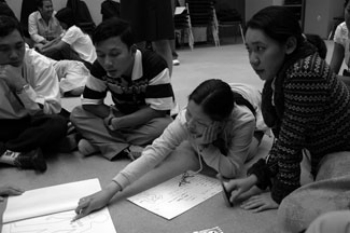TREAT Asia’s ICAAP Sessions Address Treatment Issues
October 2005—TREAT Asia presented three well-attended sessions at this year’s ICAAP dealing with a range of issues related to care and treatment:

At TREAT Asia's ICAAP skills-building workshop, participants worked together to develop treatment education strategies and discussed their experiences.
|
Satellite Symposium on National Treatment Programs
TREAT Asia organized a satellite symposium on 2 July, which focused attention on treatment programs in four Asian countries that may influence the direction of HIV treatment in the region.
A panel of experts from China, India, Indonesia, and Thailand presented an overview of their national programs and offered insights into efforts to scale up antiretroviral treatment in the region. Their presentations were followed by a panel discussion that addressed some of the larger questions about ARVs, such as sustainability, durability, and the ramifications of the success or failure of the four national treatment programs. The symposium brought together representatives from the U.S. Centers for Disease Control, the National Institutes of Health, and other international health organizations such as the World Health Organization, along with front-line HIV/AIDS care and service providers.
Skills-Building Workshop
Overcoming apathy towards complex treatment regimens is one of the greatest challenges facing people living with HIV/AIDS, whose health depends on understanding and actively participating in sustained long-term treatment. To address this problem, TREAT Asia and co-sponsor APN+ (the Asia Pacific Network of People Living with HIV/AIDS) offered a three-hour skills-building workshop on 2 July that attracted more than 30 front-line health-care providers, counselors, and educators from countries such as Cambodia, China, Mongolia, Taiwan, and Viet Nam. The workshop, titled “Treatment is About Me! Learning from Community Leadership,” examined treatment education strategies in resource-limited settings—specifically Cambodia, China, and Viet Nam. TREAT Asia community education program manager Jennifer Ho facilitated the workshop, which focused on the lessons of the community-driven treatment education programs that are conducted by TREAT Asia and APN+.
Observational Database
The antiretroviral combination of stavudine, lamivudine, and nevirapine (D4T/3TC/NVP) is the most widely used front-line treatment regimen for HIV/AIDS in the world. This combination is frequently employed in Asian countries because the individual drugs are available as generics and can be obtained in a convenient combined and fixed-dose formulation. Using information gathered from clinics across Asia, on 4 July scientists from the TREAT Asia HIV Observational Database (TAHOD) presented an analysis of data on patients who stop front-line treatment with D4T/3TC/NVP. Close to 100 people listened as Dr. Rossana Ditangco described TAHOD’s data about the rate at which patients halt this drug combination, the reasons for cessation, factors associated with stopping treatment, and the spectrum of regimens selected after a D4T/3TC/NVP switch.